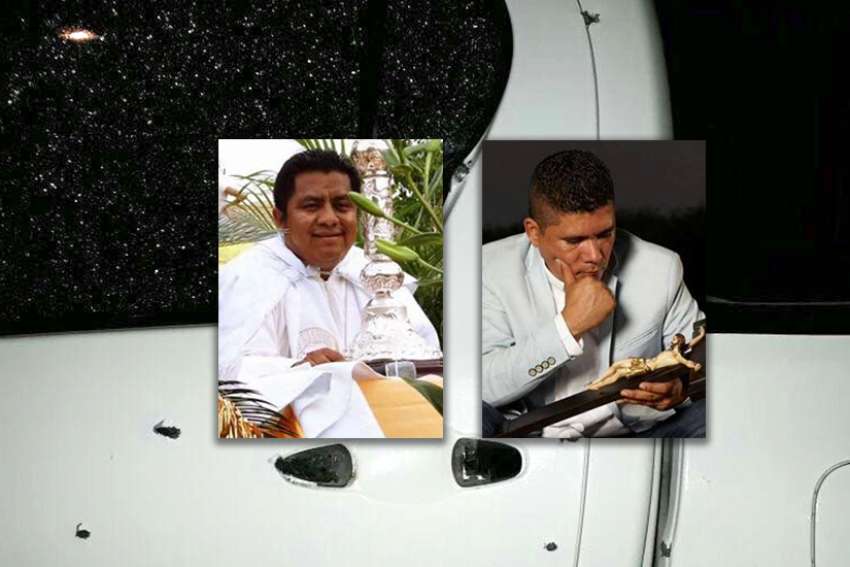Bishop Rangel of Guerrero said the two slain priests were musicians, who performed in remote hamlets and "approached people" and "evangelized" through music. Father Muniz, he said, was famed for his parish choir, while Father Anorve came from the Costa Chica region, at least five hours away.
CNS photo, Diocese of Chilpancingo-Chilapa
Bishop denies murdered Mexican priest had gang ties
By Catholic News Agency
ACAPULCO, Mexico – The Bishop of Chilpancingo-Chilapa, Mexico denied that Fr. Germain Muñiz Garcia, who was murdered on a Mexican highway Feb. 5 along with Fr. Iván Añorve Jaimes, had any connection to organized crime, as the Guerrero State Prosecutor's Office has recently claimed.
In a statement released Feb 7, Bishop Salvador Rangel Mendoza said that Fr. Muñiz Garcia “was never connected to any criminal gang.”
However, he said that the deceased priest “had knowledge, by the very nature of his pastoral work, of some gangs operating in that area, since being a pastor and a public person he had to travel through the area where those gangs were based in order to to serve the different communities.”
The Mexican bishop responded in his statement to the accusations lodged by the Guerrero State Prosecutor's Office, which claimed that the murdered priest belonged to “a criminal gang, by reason of the photographs and notes that circulated on the priest's social media,” posted months prior, where he is seen with a rifle alongside masked criminals.
According to the authorities, both priests were traveling to the town of Taxco de Alarcón to attend a party. According to the State Prosecutor's Office, “it is known that many people belonging to different criminal gangs went there from Guerrero State as well as Morelos and Mexico States.”
“At said party there was no municipal, state or federal security, since preventative security support for the party was not requested from any authority by the organizers.”
According to the Prosecutor's Office, a conflict during the party “triggered the armed attack” which ended the lives of the Mexican priests.
Four people who survived the attack were also traveling in the vehicle in which the priests died, including Fr. Germain's sister.
Bishop Rangel Mendoza noted there are serious inconsistencies with the Prosecutor's Office's version of what happened.
“The Prosecutor's statement seems strange to us, in that in the same place, Juliantla, in Guerrero, 'members of criminal gangs from Morelos, Mexico and Guerrero States would have gotten together,' without any reports of any confrontations between them or participants in the event. We also note the absence of municipal or state law enforcement, knowing the presence of the stated gangs,” the prelate stated.
The neighboring Archdiocese of Acapulco also expressed their criticism of the Prosecutor's Office in a statement.
“It seems strange to us that people belonging to different criminal gangs, carrying weapons, could have gotten along with each other at the dance, without any incident. This does not seem to be their ordinary conduct,” they said.
In addition, they pointed out, the four survivors of the attack maintained “that there was no conflict at where the dance was held.”
“These four survivors report that coming back to Taxco they passed the assailants' car which went after them, caught up with them, blocked their way and shot them,” the Archdiocese of Acapulco stated.
Regarding the photograph of the priest carrying a firearm alongside criminals, Bishop Rangel Mendoza told the press that although “it was extremely imprudent,” of him, and that he reprimanded the priest at the time, Fr. Muñiz Garcia “had to pass through the drug traffickers' territories,” and he had to “greet them, he had to dialogue with them, he had to do it, because he had to pass through their territory, how else was he going to get through?”
The bishop said the priests went to the party “to offer their music and see if they would let them sing a few songs.”
In his statement, the prelate asked that “the investigations be objective, truthful and adhering to the law and the truth of the facts,” and that if the Prosecutor's Office claims that the priest belonged to some criminal gang, “(I) urge them to specifically determine to which criminal gang he belonged to and not to limit themselves to making simple accusations.”
In addition, he demanded from the Guerrero State Prosecutor's Office “a complete and certified copy of the file on the investigation that supports the said statements, since as the Prosecutor has the obligation to determine what actually happened, supporting the findings with reliable and truthful evidence.”
This article was originally published by our sister agency, ACI Prensa. It has been translated and adapted by CNA.
Tagged under:
Please support The Catholic Register
Unlike many media companies, The Catholic Register has never charged readers for access to the news and information on our website. We want to keep our award-winning journalism as widely available as possible. But we need your help.
For more than 125 years, The Register has been a trusted source of faith-based journalism. By making even a small donation you help ensure our future as an important voice in the Catholic Church. If you support the mission of Catholic journalism, please donate today. Thank you.
DONATE

